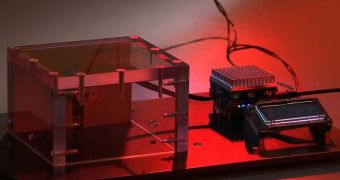Experts from the Eidgenossische Technische Hochschule (the Swiss Federal Institute of Technology) in Zurich, a scientific and technological university in Switzerland, have recently managed to create a small motor the size of a matchbook that is the absolute uncontested holder of the spinning record. The tiny device is able to spin at an incredible velocity of more than a million rotations per minute (rpm). For those of you who prefer not to do the math, that's over 16,667 rotations per second.
It's extremely hard to imagine such a thing, especially since there's not much (if anything at all) to compare it with, both in nature or in the technological world. For instance, as Live Science indicates, the neutron stars, the collapsed core of dead stars, only spin at about 60,000 rpm, as by exceeding that velocity, they would slowly disintegrate. Next in line is the average kitchen blender with about half that performance, while the best car engines barely reach an unworthy 10,000 rpm. The only things that get close to the novel miniature motor are industrial engines which can achieve a maximum of 250,000 rpm.
The small engine's rotor is comprised within a titanium shell that prevents it from flying apart, while the technology used for the cylinder that holds the super-thin copper wires for winding purposes is still kept secret. But a statement from the developers still disclosed that the cylinder is "made of special iron previously unused for machines".
Perhaps you are asking who would use such a tiny and fast motor. Well, there's an answer to that as well, although not very clear yet. "Our findings will rapidly be converted into concrete applications and products," stated Johann Kolar, one of the experts involved in the breakthrough achievement. Basically, as technology tends to yield more miniature devices (like cameras, cell phones or computers), these require tinier holes that can only be drilled by small devices rotating at incredible speeds.
Also, far more efficient compressors for any type of vehicles that use them could be developed. A company called Celeroton has already been established in Switzerland with this exact purpose: use the novel technology in order to enhance existing products.

 14 DAY TRIAL //
14 DAY TRIAL //